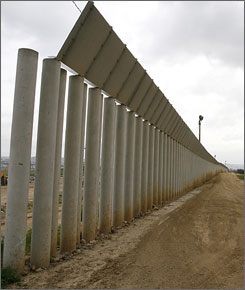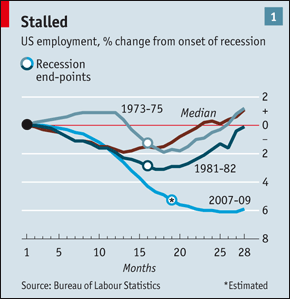Our broken low-wage labor market
 Wednesday, May 12, 2010 at 12:05AM
Wednesday, May 12, 2010 at 12:05AM  Bloomberg BusinessWeek story says our immigration system isn't broken nearly as much as our low-wage labor market.
Bloomberg BusinessWeek story says our immigration system isn't broken nearly as much as our low-wage labor market.
Russell Sage Foundation says that the US has the highest advanced-economy share of low-paying jobs (defined as less than 2/3rds the median wage) at 25%. France and Denmark sit down at around 10%.
How do they do this?
In other developed nations, nannies, sale clerks, and waiters are well-trained and earn living wages.
The example of Europe here is explained in more detail:
Investing in employees to upgrade their skills and put them on a path to promotions and higher pay is good for employers as well as workers. In Denmark, meatpacker Danish Crown pays relatively high union wages and competes successfully with American meatpackers that have turned to immigrants to keep wages low. In the U.S., companies like CVS, the drugstore chain; Staples, the office-supply chain; and Nypro, an employee-owned plastics maker, have shown the profit potential in hiring low-skilled workers and training them for advancement. "It's not the border that's broken, it's our low-wage labor market," says John Schmitt, an economist with the Center for Economic and Policy Research, a nonpartisan think tank in Washington. Schmitt co-edited a book called "Low-Wage Work in the Wealthy World" based on the Russell Sage-funded research.
You can't have high unemployment and high immigration at the same time, but as the piece points out, when there's a huge disparity between supply and demand, prohibition doesn't work either. It simply drives up the criminal delivery system, whether you're talking booze in the 1920s or people smuggling today.
We can either continue to bring in "indentured servants," as one academic calls them, or raise the living wage to the point where the jobs work for "more Americans who have drifted away from gainful employment."
 Good argument, especially when the job recovery arc on this last recession looks dramatically different from recent ones.
Good argument, especially when the job recovery arc on this last recession looks dramatically different from recent ones.










Reader Comments (3)
For 30 years, wages adjusted for inflation have been flat or declined while productivity has gone up. Demand, which traditionally is fueled by wages instead has been fueled by debt – both national and personal. That joy ride must end and soon. True recovery can not happen without increased wages. (And of course that will mean some level of inflation.) Henry Ford realized that if he paid his workers more than was customary, his workers could afford to buy his products and then both he and his workers would prosper.
Higher wages for the middle to bottom of the working class would start to help stabilize the economy, but much more is needed.
Too much of our nations money is fueling speculation. Wall Street / bank gambling should not be counted as part of our GDP - it produces nothing of value for the country. Government can institute new (old) rule sets to address this "over-exuberance." Yeah, there will be some unintended consequences, free-marketeers will scream that it limits innovation but we've seen the unintended consequences of relaxed regulations.
Government shouldn't regulate CEO compensation but corporate boards need to exercise responsibility and reign in the extreme levels compensation packages have reached; reward executives for long term corporate performance, not short term stock market performance.
Our school system doesn't teach economics much beyond balancing a check book. I, as a "boomer" product of public schools in the 1950's-1960's was instructed to be a good little cog in the corporate world – trained to do jobs, not create them. Luckily I didn't follow that avenue, but neither I nor my peers were taught to be entrepreneurs. (And we've certainly seen people in the investment world that didn't understand economics either.)
I have a hard time understanding who defines a living wage? First was does that phrase mean; second who decides the amount; third who decides what kind of jobs should be living wage jobs?
I was a college student and I needed extra income to make my way through college. Did I need a living wage? I don't know, all I needed was a few extra hundred each month. Would a living wage policy eliminate my college wage job that I needed to survive? I think so. Should all jobs at McDonald's be living wage jobs?
The living wage concept is meaningless in a free market economy.
If you don’t want low-skill people pouring into your country across your borders to fill your currently readily-available low-skill low-pay jobs raise the skill level and the pay level of these jobs. I think that might work for enough jobs to help-- provided of course that enough workers in your country can get skilled enough soon enough for these jobs. As they gain in status and public respectability at their new levels of skill and pay, these jobs may have interesting side effects on the economy. Workers in these now “good jobs” can’t be let go as easily which is not always entirely a good thing as it may tie an employer to a location or impair some necessary business/operational decision in a changing business/operational environment. As an example of how far and how wrong this can go consider what happened in the automobile manufacturing industry. Admittedly this is an extreme case and maybe experience has taught employers to be careful with this kind of thing. (Could the economics of this be cyclic in some way?)